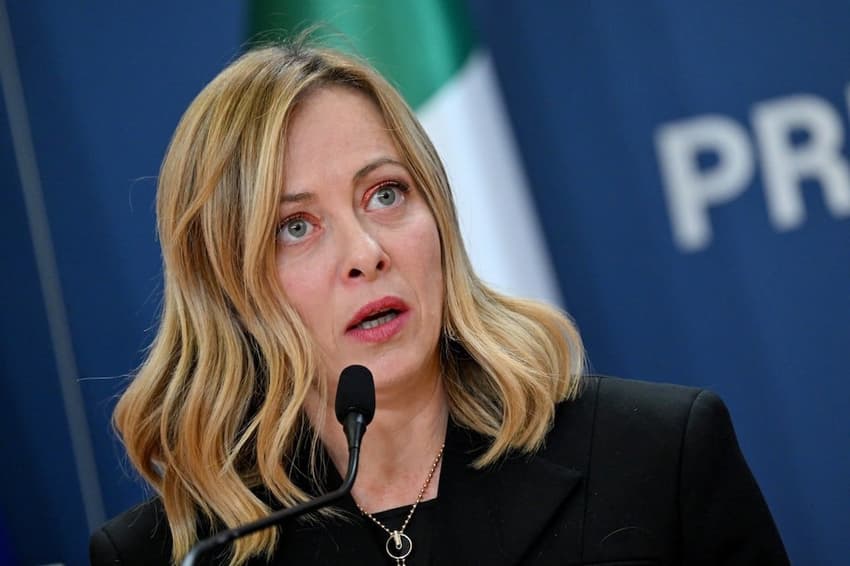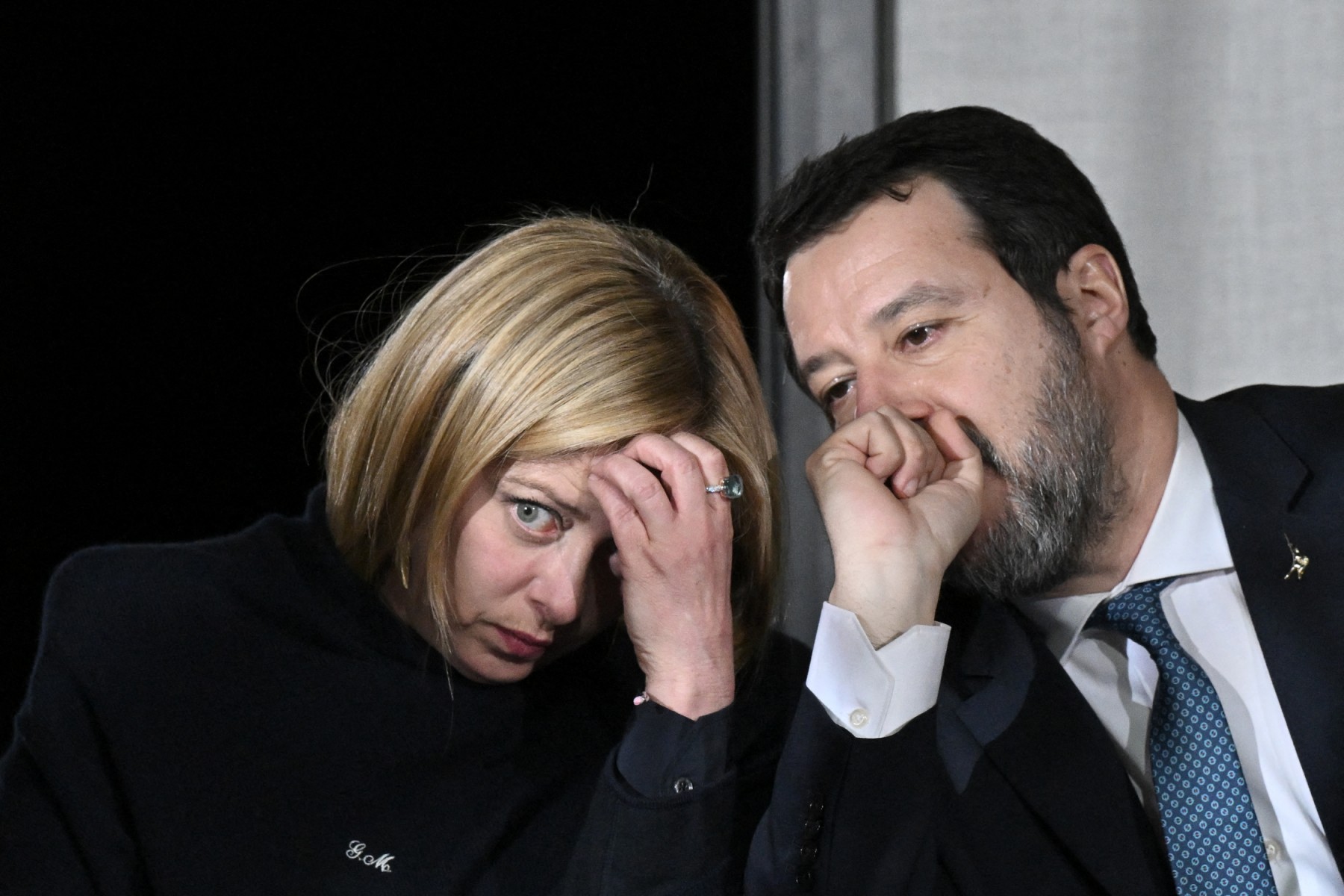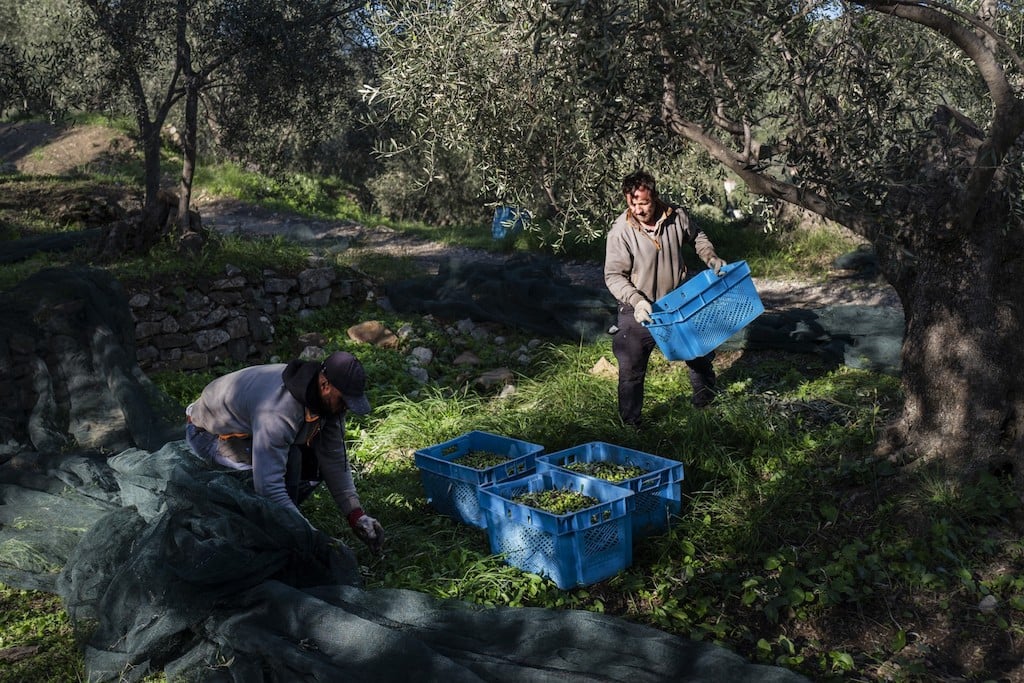How has Italy's 'anti-immigrant' government changed the rules for foreigners?

Italian Prime Minister Giorgia Meloni came to power on a strongly anti-immigration platform. But what changes has her government actually made for foreigners, and who have they affected?
In the lead-up to Italy's elections last September, then-outsider Giorgia Meloni, leader of the post-fascist Brothers of Italy party, pledged to set up a "naval blockade" to halt immigration from North Africa.
"A serious state controls and defends its borders," she wrote in a Facebook caption above a bright red and white graphic calling for a NAVAL BLOCKADE NOW.
Her long history of anti-migrant campaigning led some to assume that, once in power, Meloni would take a similar line to Sweden's far-right-backed government, elected around the same time, who have brought in a raft of measures targeting foreigners in the country - recently looking at rescinding residency permits for those deemed not to have an "upstanding way of life".
Italy's international residents voiced fears at the time that, under a Meloni government, they could face increased discrimination and hostility, and perhaps tighter restrictions on work and residency permits, visas, and citizenship applications.
So has the government, which is made up of three right-wing parties led by Brothers of Italy, actually introduced any new measures impacting foreign residents in particular?
Since taking office in October 2022, the prime minister has noticeably tamped down her rhetoric in a bid to be taken seriously by Brussels.
READ ALSO: FACT CHECK: Is Italy tightening the requirements for citizenship via ancestry?
While the government has loudly announced a number of measures designed to appear tough on migration, several of these have yet to become reality, and almost all are focused on one group in particular.
Though a naval blockade has yet to materialise, the government has issued a string of decrees targeting migrants arriving on boats via the Central Mediterranean route, whose numbers have increased dramatically in 2023.
At the start of the year, Italy passed a law ordering migrant rescue ships to return to port "without delay" after conducting a rescue, rather than searching for other boats in distress. This was approved by parliament days before the Cutro Disaster, a shipwreck off the town of Cutro on Italy's southern coast in which at least 94 people died.
In April, Meloni declared a state of emergency for immigration, and soon after issued the 'Cutro decree', which all but eliminated Italy's special protection humanitarian permit and introduced tougher sentences for traffickers.

Meloni with Deputy Prime Minister and League party leader Matteo Salvini at a press conference in Cutro on March 9th, 2023, following a deadly shipwreck. (Photo by Tiziana FABI / AFP)
The government followed this up by raising maximum immigration detention limits from three to 18 months and introducing a fee of almost €5,000 for asylum seekers to avoid detention.
Various judges dismissed the measure as unconstitutional, causing Meloni to rail that they were "lashing out against the measures of a democratically elected government," (Iolanda Apostolico, the first judge to defy the decree in a ruling, responded that "a legal issue must not be transformed into a personal affair," and invited the prime minister to appeal to the Supreme Court.)
The Italian government also made international headlines in November by signing a highly publicised deal to send migrants to offshore detention centres in Albania, which has yet to be ratified.
Most recently, Italy's parliament approved a law authorising the placement of 16 and 17-year-old minors in adult reception centres for up to 150 days, allowing adult centres to host twice as many people as usually allowed during peak immigration periods, and using X-rays to determine young migrants’ ages.
READ ALSO: What’s behind Italy’s soaring number of migrant arrivals?
If it sounds like Italy is following a similar playbook to the one used by the UK's Conservative government, that's no accident - Meloni and British Prime Minister Rishi Sunak in October made a joint announcement of their plan to "co-ordinate enforcement operations" as they "fight organised immigration crime".
Where the two leaders differ, though, is in their approach to regular migration.
Earlier this year, Italy quietly introduced 136,000 non-EU work permits in its 2023 decreto flussi employment decree: the highest number since 2008, according to Reuters, though the quota was still massively over-subscribed, with over 600,000 pre-applications.
In October, the Italian government signed a separate deal to bring over 4,000 workers from Tunisia.

The demand for foreign workers in Italy vastly exceeds the number of available work permits. Photo by MARCO BERTORELLO / AFP.
A couple of measures have also been tabled that could make life more difficult for 'regular' immigrants, including a 2024 budget proposal to introduce a €2,000 fee for some foreign nationals to access Italy's national health service, and a draft law proposed by one senator that would tighten the rules around applying for Italian citizenship by ancestry.
But it seems more than likely that neither of these proposals will come to pass - the first still needs to be approved by the senate, and the latter isn't a priority for the government.
All of this makes Italy quite different to Sweden and the UK, whose governments are both planning to dramatically increase the minimum salary threshold for foreigners to obtain a work visa, among other policies aimed at slashing net migration figures.
Sweden is proposing to raise its threshold from the equivalent of €13,500 to €28,500, and the UK from £26,200 to just under £38,000. Italy has not made any move to increase its minimum income threshold of €8,500.
Instead, Italy has increased the number of permits available this year, and the number will increase further in 2024 and 2025, for people coming to work in certain sectors
READ ALSO: Italian work permits: Who needs one and how do you get it?
Experts say the country's chronic labour shortage and ageing population mean the government has little alternative to opening legal channels for migrant workers.
"A baby who is born today will enter the labour market in 20 years' time, whereas someone who arrives here is 20 and can be put to work immediately," former lawmaker Giuliano Cazzola told Reuters.
The government's policy of increasing permits for foreign workers as a practical necessity is notably at odds with Meloni's previous championing of the ‘great replacement’ conspiracy theory, particularly her 2017 claims that "left-wing" governments want to "replace Italians with immigrants".
Your experience an an immigrant in Italy under the Meloni government, then, depends very much on who you are and how you entered the country.
Those arriving by boat without a visa face more dangerous journeys, longer detention limits in more cramped conditions, and a more hostile environment, particularly for minors.
For other categories of immigrants, little has changed under the current regime - at least for now.
Comments (3)
See Also
In the lead-up to Italy's elections last September, then-outsider Giorgia Meloni, leader of the post-fascist Brothers of Italy party, pledged to set up a "naval blockade" to halt immigration from North Africa.
"A serious state controls and defends its borders," she wrote in a Facebook caption above a bright red and white graphic calling for a NAVAL BLOCKADE NOW.
Her long history of anti-migrant campaigning led some to assume that, once in power, Meloni would take a similar line to Sweden's far-right-backed government, elected around the same time, who have brought in a raft of measures targeting foreigners in the country - recently looking at rescinding residency permits for those deemed not to have an "upstanding way of life".
Italy's international residents voiced fears at the time that, under a Meloni government, they could face increased discrimination and hostility, and perhaps tighter restrictions on work and residency permits, visas, and citizenship applications.
So has the government, which is made up of three right-wing parties led by Brothers of Italy, actually introduced any new measures impacting foreign residents in particular?
Since taking office in October 2022, the prime minister has noticeably tamped down her rhetoric in a bid to be taken seriously by Brussels.
READ ALSO: FACT CHECK: Is Italy tightening the requirements for citizenship via ancestry?
While the government has loudly announced a number of measures designed to appear tough on migration, several of these have yet to become reality, and almost all are focused on one group in particular.
Though a naval blockade has yet to materialise, the government has issued a string of decrees targeting migrants arriving on boats via the Central Mediterranean route, whose numbers have increased dramatically in 2023.
At the start of the year, Italy passed a law ordering migrant rescue ships to return to port "without delay" after conducting a rescue, rather than searching for other boats in distress. This was approved by parliament days before the Cutro Disaster, a shipwreck off the town of Cutro on Italy's southern coast in which at least 94 people died.
In April, Meloni declared a state of emergency for immigration, and soon after issued the 'Cutro decree', which all but eliminated Italy's special protection humanitarian permit and introduced tougher sentences for traffickers.

The government followed this up by raising maximum immigration detention limits from three to 18 months and introducing a fee of almost €5,000 for asylum seekers to avoid detention.
Various judges dismissed the measure as unconstitutional, causing Meloni to rail that they were "lashing out against the measures of a democratically elected government," (Iolanda Apostolico, the first judge to defy the decree in a ruling, responded that "a legal issue must not be transformed into a personal affair," and invited the prime minister to appeal to the Supreme Court.)
The Italian government also made international headlines in November by signing a highly publicised deal to send migrants to offshore detention centres in Albania, which has yet to be ratified.
Most recently, Italy's parliament approved a law authorising the placement of 16 and 17-year-old minors in adult reception centres for up to 150 days, allowing adult centres to host twice as many people as usually allowed during peak immigration periods, and using X-rays to determine young migrants’ ages.
READ ALSO: What’s behind Italy’s soaring number of migrant arrivals?
If it sounds like Italy is following a similar playbook to the one used by the UK's Conservative government, that's no accident - Meloni and British Prime Minister Rishi Sunak in October made a joint announcement of their plan to "co-ordinate enforcement operations" as they "fight organised immigration crime".
Where the two leaders differ, though, is in their approach to regular migration.
Earlier this year, Italy quietly introduced 136,000 non-EU work permits in its 2023 decreto flussi employment decree: the highest number since 2008, according to Reuters, though the quota was still massively over-subscribed, with over 600,000 pre-applications.
In October, the Italian government signed a separate deal to bring over 4,000 workers from Tunisia.

A couple of measures have also been tabled that could make life more difficult for 'regular' immigrants, including a 2024 budget proposal to introduce a €2,000 fee for some foreign nationals to access Italy's national health service, and a draft law proposed by one senator that would tighten the rules around applying for Italian citizenship by ancestry.
But it seems more than likely that neither of these proposals will come to pass - the first still needs to be approved by the senate, and the latter isn't a priority for the government.
All of this makes Italy quite different to Sweden and the UK, whose governments are both planning to dramatically increase the minimum salary threshold for foreigners to obtain a work visa, among other policies aimed at slashing net migration figures.
Sweden is proposing to raise its threshold from the equivalent of €13,500 to €28,500, and the UK from £26,200 to just under £38,000. Italy has not made any move to increase its minimum income threshold of €8,500.
Instead, Italy has increased the number of permits available this year, and the number will increase further in 2024 and 2025, for people coming to work in certain sectors
READ ALSO: Italian work permits: Who needs one and how do you get it?
Experts say the country's chronic labour shortage and ageing population mean the government has little alternative to opening legal channels for migrant workers.
"A baby who is born today will enter the labour market in 20 years' time, whereas someone who arrives here is 20 and can be put to work immediately," former lawmaker Giuliano Cazzola told Reuters.
The government's policy of increasing permits for foreign workers as a practical necessity is notably at odds with Meloni's previous championing of the ‘great replacement’ conspiracy theory, particularly her 2017 claims that "left-wing" governments want to "replace Italians with immigrants".
Your experience an an immigrant in Italy under the Meloni government, then, depends very much on who you are and how you entered the country.
Those arriving by boat without a visa face more dangerous journeys, longer detention limits in more cramped conditions, and a more hostile environment, particularly for minors.
For other categories of immigrants, little has changed under the current regime - at least for now.
Join the conversation in our comments section below. Share your own views and experience and if you have a question or suggestion for our journalists then email us at [email protected].
Please keep comments civil, constructive and on topic – and make sure to read our terms of use before getting involved.
Please log in here to leave a comment.